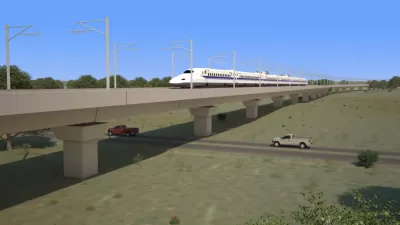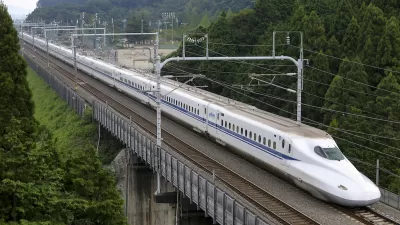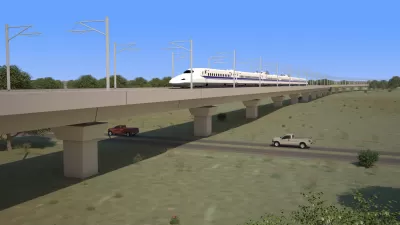The Texas Attorney General took a break from its crusade against unsubstantiated claims of voter fraud to weigh in on a controversial question of property rights.

Legal questions about the use of eminent domain for the Texas Central Railway high-speed rail system between Houston and Dallas are persisting nearly six months after the Texas Supreme Court refused to hear an appeal for a lawsuit filed by a Leon County landowner, James Miles, potentially affected by the route's construction.
Planetizen picked up news of the unanswered legal questions surrounding the use of eminent domain for the Texas Central Railway in 2014, 2016, and 2020. In 2021, the news seemed mostly positive for Texas Central after the private rail company signed construction contracts signed and bagged the aforementioned decision by the state's highest court.
According to an article by Alexa Ura for the Texas Tribune, however, the legal case against the company's use of eminent domain has a powerful new proponent, adding a new twist in the saga.
"The Texas attorney general’s office has put its weight behind a landowner’s case against the companies developing a controversial Dallas-Houston bullet train, arguing they can’t force people to sell parcels needed for the high-speed rail project," writes Ura.
"In a legal brief filed with the Texas Supreme Court on Friday, deputies for Texas Attorney General Ken Paxton argued the high court should reverse that appellate decision and rule in Miles’ favor because the companies fall short of the Texas Constitution’s definition of a rail company," explains Ura.
If Texas central clears these legal hurdles and acquires the necessary funding (promised to be sourced from private sources), the system would accommodate trains traveling up to 205 mph and making the trip between Dallas and Houston—which takes four hours by car—in 90 minutes.

Planetizen Federal Action Tracker
A weekly monitor of how Trump’s orders and actions are impacting planners and planning in America.

Maui's Vacation Rental Debate Turns Ugly
Verbal attacks, misinformation campaigns and fistfights plague a high-stakes debate to convert thousands of vacation rentals into long-term housing.

Restaurant Patios Were a Pandemic Win — Why Were They so Hard to Keep?
Social distancing requirements and changes in travel patterns prompted cities to pilot new uses for street and sidewalk space. Then it got complicated.

In California Battle of Housing vs. Environment, Housing Just Won
A new state law significantly limits the power of CEQA, an environmental review law that served as a powerful tool for blocking new development.

Boulder Eliminates Parking Minimums Citywide
Officials estimate the cost of building a single underground parking space at up to $100,000.

Orange County, Florida Adopts Largest US “Sprawl Repair” Code
The ‘Orange Code’ seeks to rectify decades of sprawl-inducing, car-oriented development.
Urban Design for Planners 1: Software Tools
This six-course series explores essential urban design concepts using open source software and equips planners with the tools they need to participate fully in the urban design process.
Planning for Universal Design
Learn the tools for implementing Universal Design in planning regulations.
Heyer Gruel & Associates PA
JM Goldson LLC
Custer County Colorado
City of Camden Redevelopment Agency
City of Astoria
Transportation Research & Education Center (TREC) at Portland State University
Jefferson Parish Government
Camden Redevelopment Agency
City of Claremont




























